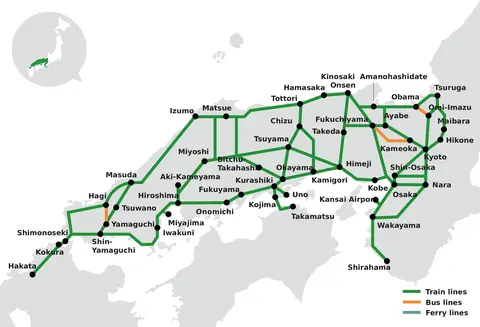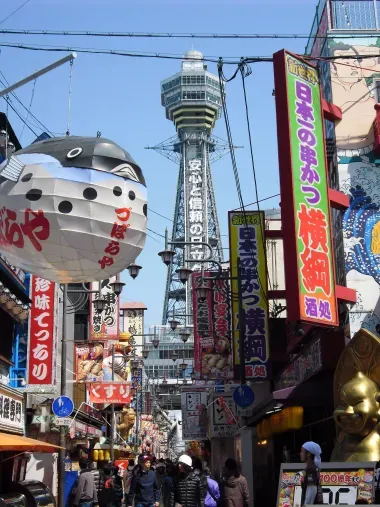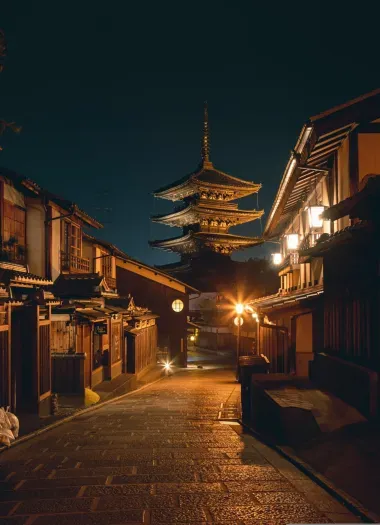Sanyo Sanin Pass

Sanyo region
Entdecken sie mit dem Sanyo Sanin Pass die wunderschöne und vielseitige Sanyo region. Beginnen sie mit dem nach dem 2. Weltkrieg wieder aufgebaute Hiroshima und besuchen sie die Gedenkstätte und das Schloß, ein Symbol des einstigen Feudalsystems.
Weiter geht es mit der Stadt Fukuoka, die sie mit ihrer einzigartigen Kultur überraschen wird. Der Hafen der Stadt liegt gegenüber von Korea und war somit das Tor für den ersten Austausch zwischen dem Inelsreich und dem Kontinent. Hier vermischen sich auf charmante Art Natur, Stadt und Tradition: eine historische Stadt, die sie unbedingt besuchen sollten.
Zuletzt stoppen sie bei den Gärten von Okayama und lassen sich von Farben und Licht verzaubern. Mit dem Sanyo Sanin Pass reisen sie ebenfalls zwischen Osaka, Nara und Kyoto und an Bord der Fähre nach Miyajima, wo sie das berühmte Torii und das Heiligtum von Itsukushima besuchen können, der ein UNESCO Weltkulturerbe ist.

Highlights des SANYO-SANIN Pass:
So nutzen Sie den SANYO-SANIN Pass
Versand
- Wir senden Ihnen den e-Voucher innerhalb von 5 Werktagen nach Ihrer Bestellung an Ihre E-Mail Adresse. Wenn Sie ihn früher erhalten möchten, kontaktieren Sie uns bitte. (Der e-Voucher ist NICHT das eigentliche Ticket, Sie können mit dem Voucher nicht mit dem Zug fahren)
- Sie können den e-Voucher auf Papier ausdrucken oder den Voucher beim Umtausch einfach auf Ihrem mobilen Gerät vorzeigen.
Umtausch
- Sie können den Gutschein an einer der folgenden Stellen gegen den Sanyo-Sanin Pass eintauschen:
(zum Zeitpunkt des Umtauschs müssen Sie Ihren Reisepass vorlegen)
Gültigkeit
Der Sanyo-Sanin Pass ist ab dem Datum der Aktivierung 7 Tage lang nutzbar.
Die folgenden Zuglinien sind im Pass enthalten:
Sitzplatzreservierung
- Mit dem Pass ist keine zusätzliche Gebühr für reservierte Plätze erforderlich.
- Wagons mit Sitzplätzen, die keine Reservierung benötigen, können gegen Vorlage des Passes frei genutzt werden.
- Für reservierte Plätze in der ersten Klasse (grüne Wagen) müssen Sie zusätzliche Gebühren entrichten.
- Um die Bahnsteige zu betreten, zeigen Sie Ihren Pass dem JR-Personal an den Bahnsteigschranken.
- Um einen Sitzplatz zu reservieren, bringen Sie den Pass zum JR-Personal am Fahrkartenschalter.
- Es handelt sich um einen persönlichen Pass, der nicht auf eine andere Person übertragen werden kann.
- Bitte tragen Sie immer Ihren Reisepass bei sich, wenn Sie den Pass benutzen, da das Bahnhofs- und Zugpersonal ihn überprüfen kann.
Stornierung und Änderungen
- Ein nicht genutzter Gutschein kann bis zu einem Jahr ab Ausstellungsdatum erstattet werden.
- Der Gutschein kann zurückerstattet werden, wenn er in Japan nie gegen den Pass eingetauscht wurde.
- Es wird eine Stornogebühr von 15 % des Gutscheinpreises einbehalten.
- Für einen Gutschein, der mehr als ein Jahr nach dem Ausstellungsdatum ausgestellt wurde, ist keine Erstattung mehr möglich.
- Für einen verlorenen oder gestohlenen Pass ist keine Erstattung möglich.
Berechtigung
Besucher, die als Touristen reisen und einen befristeten Einreisestatus haben (Temporary Visitor), sind berechtigt, diesen Pass zu benutzen.
Inhaber eines japanischen Reisepasses haben keinen Anspruch auf diesen Pass.
Den Westen Japanes erkunden
Die Regionen Sanyo und Sanin in Japan umfassen eine Vielzahl von Präfekturen und Orten, die Reisende von den größten Städten bis hin zu den reizvollen, wenn auch oft übersehenen Landschaften führen. Besuchen Sie die Sandstrände von Wakayama, das geschäftige Stadtbild von Osaka und dann das historische Hiroshima, und beenden Sie Ihre Reise mit Kyushu, dessen größte Stadt Fukuoka eine kulinarische Hauptstadt mit unzähligen Aktivitäten ist.
Fukuoka
Die südlichste Stadt, für die der Pass gilt, ist übrigens Fukuoka, die sie beim Besuch durch ihre einzigartige Kultur überraschen wird. Das Hafengebiet gegenüber von Korea war das Zentrum des ersten Austauschs zwischen Japan und dem restlichen asiatischen Kontinent.
Fukuoka hat viele schöne Schreine und Tempel zu bieten, wenn man auf der Suche nach historischen Stätten ist. Einer der berühmtesten Bezirke Fukuokas, Hakata, ist bei Feinschmeckern weltberühmt für sein Street Food und die legendären Hakata Tonkotsu Ramen, eine lokale Nudelspezialität mit einer Brühe aus gekochten Schweineknochen.
Fukuoka ist eine charmante Mischung aus Urbanität und Tradition, ein historischer Ort, den man unbedingt besuchen sollte.
Hiroshima
Hiroshima, eine relativ kurze Shinkansen-Fahrt von Osaka und Kyoto in Kansai entfernt, hat sich als Ort des ersten Atombombenabwurfs im Jahr 1945 einen ergreifenden Platz in der Weltgeschichte verdient. Aber diese moderne Stadt bietet heutzutage mehr als nur Erinnerungen. Mit ihrem Peace Memorial Park ist sie eine Stadt der Hoffnung. Sie bietet ihren Besuchern zahlreiche touristische Attraktionen, darunter eine rekonstruierte Burg von Hiroshima und die Shukkei-en-Gärten.
Darüber hinaus wird Hiroshima oft für seine kulinarische Kultur zitiert, die einzigartige Interpretationen japanischer Straßengerichte hervorbringt, wie z. B. Okonomiyaki, das sich durch den Yakisoba-Boden von der klassischen Osaka-Variante unterscheidet. Auch Austern sind eine berühmte Delikatesse Hiroshimas, die oft roh oder in anderen Gerichten gegessen werden. Besuchen Sie diese symbolträchtige Stadt der Kultur und Geschichte!
Gebiet von Chugoku
Der Sanyo Sanin Pass umfasst auch Orte wie den Izumi-Schrein in Shimane, Tottori und seine berühmten Sanddünen, Tsuruga in Fukui, das für seine großartigen Strände bekannt ist, sowie die Bahnhöfe Takamatsu auf der Insel Shikoku und Uno, beides Zugangspunkte zur Kunstinsel Naoshima. Dieses Gebiet ist von Hiroshima aus leicht mit dem Zug zu erreichen.
Gebiet von Kansai
Verpassen Sie auf keinen Fall die Korakuen-Gärten in Okayama, die zu den drei besten Gärten Japans gehören. Mit dem Pass können Sie auch die Verkehrsmittel zwischen Osaka, Nara und Kyoto sowie die Fähre nach Miyajima in Hiroshima nutzen, wo Sie das berühmte Torii des Itsukushima-Schreins, ein UNESCO-Weltkulturerbe, bewundern können.
Der JR Sanyo Sanin Area Pass ermöglicht den Zugang zu einer Vielzahl von Reisezielen, die über eine Reihe von Bahnsystemen erreichbar sind, darunter der Sanyo Shinkansen, der von Zügen wie dem Nozomi Shinkansen, dem Mizuho Shinkansen, dem Hikari Shinkansen, dem Sakura Shinkansen und dem Kodama Shinkansen bedient wird.
FAQs - häufig gestellte Fragen









